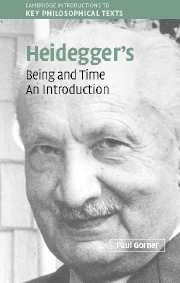2 - The question of being
Published online by Cambridge University Press: 05 June 2012
Summary
The Introduction to Being and Time is preceded by a short piece of text, later referred to by Heidegger as the Foreword, which starts with a quotation from Plato's Sophist. The Eleatic Stranger, a follower of Parmenides and Zeno, is depicted as saying: ‘For manifestly you have long been aware of what you mean when you use the expression “being”. We, however, who used to think we understood it, have now become perplexed.’ Heidegger asks whether we today (he was writing in the 1920s) have an answer to the question of what we mean by the word ‘being’ (seiend) and is emphatic that we do not. And it is not just a matter of being perplexed about the meaning. We lack the understanding for the significance of the question. The task of the Introduction is to reawaken this understanding.
Once this has been done the preliminary aim of Being and Time is the ‘interpretation of time as the possible horizon of any understanding of being’. This already gives us some indication of how we should understand the title of the work. The relationship between being and time is not one of opposition. Rather their relationship is such that the latter is the key to the meaning of the former. However, it will emerge that by ‘time’ Heidegger does not mean what we ordinarily understand by the term.
- Type
- Chapter
- Information
- Heidegger's Being and TimeAn Introduction, pp. 13 - 33Publisher: Cambridge University PressPrint publication year: 2007

